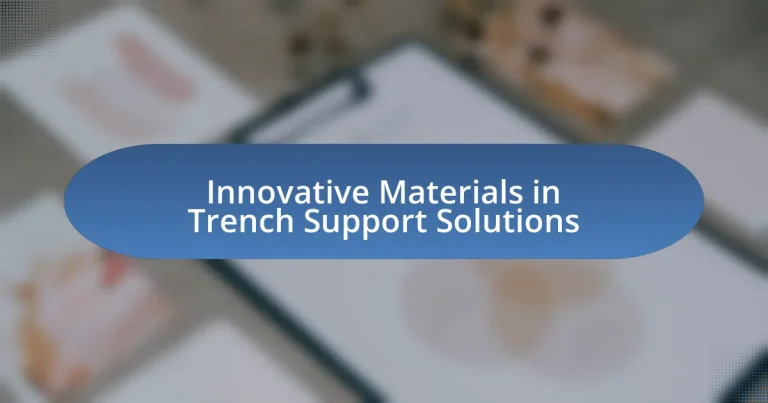Innovative materials in trench support solutions encompass advanced composites, high-strength steel, and engineered polymers, which significantly enhance the structural integrity and safety of trench systems. These materials provide benefits such as increased load-bearing capacity, reduced weight, and improved resistance to environmental factors, leading to faster installation and lower costs. The article explores how these innovative materials outperform traditional options, addressing challenges faced by conventional materials and highlighting their role in enhancing safety and efficiency in excavation projects. Additionally, it discusses the latest advancements, including the integration of smart materials and nanotechnology, which further optimize trench support designs for modern construction needs.

What are Innovative Materials in Trench Support Solutions?
Innovative materials in trench support solutions include advanced composites, high-strength steel, and engineered polymers. These materials enhance the structural integrity and safety of trench systems, allowing for lighter, more durable, and corrosion-resistant options. For instance, high-strength steel offers superior load-bearing capacity compared to traditional materials, while engineered polymers provide flexibility and resistance to environmental factors. The use of these innovative materials has been shown to reduce installation time and costs, as well as improve overall project efficiency in construction and civil engineering applications.
How do innovative materials enhance trench support systems?
Innovative materials enhance trench support systems by providing increased strength, durability, and lightweight properties. For instance, the use of high-performance polymers and composite materials allows for greater load-bearing capacity while reducing the overall weight of support structures. This results in easier installation and reduced transportation costs. Additionally, advanced materials often exhibit improved resistance to environmental factors such as corrosion and moisture, which prolongs the lifespan of trench supports. Research indicates that using fiber-reinforced composites can increase the structural integrity of trench systems by up to 30%, demonstrating their effectiveness in enhancing safety and reliability in excavation projects.
What specific properties make these materials suitable for trench support?
The specific properties that make materials suitable for trench support include high compressive strength, durability, and resistance to soil pressure. High compressive strength ensures that the materials can withstand the weight of the surrounding soil and any additional loads, preventing collapse. Durability allows the materials to resist degradation over time due to environmental factors, ensuring long-term stability. Resistance to soil pressure is critical, as it enables the materials to maintain structural integrity under varying soil conditions. These properties are essential for ensuring safety and effectiveness in trench support applications.
How do innovative materials compare to traditional materials in trench support?
Innovative materials in trench support offer superior performance compared to traditional materials. For instance, advanced composites and engineered polymers provide enhanced strength-to-weight ratios, allowing for lighter and more efficient support systems. Traditional materials, such as steel and concrete, while strong, are often heavier and can lead to increased excavation costs and logistical challenges. Additionally, innovative materials often exhibit better resistance to corrosion and environmental factors, resulting in longer service life and reduced maintenance needs. Studies have shown that using innovative materials can decrease installation time by up to 30%, demonstrating their efficiency over conventional options.
Why is the use of innovative materials important in trench support?
The use of innovative materials in trench support is crucial for enhancing safety and efficiency in excavation projects. These materials, such as high-strength composites and advanced polymers, provide superior structural integrity and resistance to environmental factors compared to traditional materials like wood or steel. For instance, studies have shown that composite materials can reduce the weight of trench supports while maintaining or improving load-bearing capacity, thus minimizing the risk of collapse. Additionally, innovative materials often exhibit better durability and corrosion resistance, leading to longer service life and reduced maintenance costs. This combination of benefits underscores the importance of adopting innovative materials in trench support systems to ensure worker safety and project success.
What challenges do traditional materials face in trench support applications?
Traditional materials in trench support applications face challenges such as limited strength-to-weight ratios, susceptibility to corrosion, and difficulty in installation. These materials, like wood and steel, often lack the necessary durability and flexibility required for varying soil conditions, which can lead to structural failures. For instance, wood can rot and steel can corrode when exposed to moisture, compromising the integrity of the trench support. Additionally, traditional materials may not provide adequate support in unstable or shifting soils, increasing the risk of cave-ins. These limitations highlight the need for innovative materials that can enhance safety and efficiency in trench support solutions.
How do innovative materials address safety concerns in trench support?
Innovative materials enhance safety in trench support by providing increased strength, flexibility, and resistance to environmental factors. For instance, advanced composites and engineered polymers can withstand greater loads and resist corrosion, reducing the risk of structural failure. Research indicates that using high-performance materials, such as fiber-reinforced polymers, can improve the overall stability of trench systems, thereby minimizing accidents and injuries. Additionally, these materials often allow for lighter and more efficient designs, which can be easier to install and remove, further enhancing safety during excavation and construction processes.

What types of innovative materials are used in trench support solutions?
Innovative materials used in trench support solutions include high-strength steel, aluminum, composite materials, and engineered polymers. High-strength steel is favored for its durability and load-bearing capacity, making it suitable for deep excavations. Aluminum is lightweight and corrosion-resistant, which enhances mobility and reduces installation time. Composite materials, such as fiberglass, offer high strength-to-weight ratios and resistance to environmental factors. Engineered polymers provide flexibility and impact resistance, making them ideal for various soil conditions. These materials collectively improve safety, efficiency, and longevity in trench support applications.
What are the most common innovative materials in trench support?
The most common innovative materials in trench support include high-strength steel, composite materials, and engineered wood products. High-strength steel is utilized for its durability and load-bearing capacity, making it ideal for deep excavations. Composite materials, such as fiberglass-reinforced polymers, offer lightweight yet strong alternatives that resist corrosion and reduce overall weight. Engineered wood products, like laminated veneer lumber, provide sustainable options with significant structural integrity. These materials are increasingly favored due to their performance characteristics and advancements in engineering technology, which enhance safety and efficiency in trench support applications.
How does fiberglass reinforce trench support systems?
Fiberglass reinforces trench support systems by providing high tensile strength and lightweight properties, which enhance the structural integrity and stability of the support systems. The incorporation of fiberglass allows for the construction of stronger, more durable trench supports that can withstand significant loads while minimizing the overall weight, making them easier to handle and install. Additionally, fiberglass is resistant to corrosion and environmental degradation, which prolongs the lifespan of trench support systems in various soil conditions. This combination of strength, lightweight characteristics, and durability makes fiberglass an effective material for reinforcing trench support solutions.
What role does high-strength steel play in modern trench support?
High-strength steel is crucial in modern trench support as it provides enhanced structural integrity and load-bearing capacity. This material allows for thinner, lighter designs while maintaining safety and stability, which is essential in deep excavations where soil pressures are significant. High-strength steel’s yield strength can exceed 700 MPa, enabling it to withstand extreme conditions and reduce the risk of trench collapses. Additionally, its durability and resistance to corrosion extend the lifespan of trench support systems, making it a preferred choice in construction projects that require reliable and efficient support solutions.
How do composite materials improve trench support solutions?
Composite materials enhance trench support solutions by providing superior strength-to-weight ratios and corrosion resistance compared to traditional materials like steel and wood. These materials, often made from a combination of fibers and resins, allow for lighter structures that are easier to handle and install, reducing labor costs and time. Additionally, their resistance to environmental factors, such as moisture and chemicals, extends the lifespan of trench supports, minimizing maintenance needs and improving overall safety. Studies have shown that composite materials can withstand significant loads while maintaining structural integrity, making them an effective choice for modern trench support applications.
What advantages do composite materials offer over conventional options?
Composite materials offer superior strength-to-weight ratios compared to conventional materials like steel and concrete. This advantage allows for lighter structures that are easier to handle and install, reducing labor costs and improving safety during construction. Additionally, composite materials exhibit enhanced resistance to corrosion and environmental degradation, which extends their lifespan and reduces maintenance needs. For instance, studies have shown that fiberglass composites can last up to three times longer than traditional materials in harsh environments, making them a more durable choice for trench support solutions.
How are composites engineered for specific trench support applications?
Composites are engineered for specific trench support applications by optimizing their mechanical properties, weight, and durability to meet the unique demands of trench environments. Engineers utilize advanced materials such as fiberglass-reinforced polymers and carbon fiber composites, which provide high strength-to-weight ratios and resistance to corrosion, ensuring structural integrity under varying soil conditions. For instance, the use of composite materials can reduce the overall weight of trench supports, facilitating easier installation and transportation while maintaining safety standards. Additionally, composites can be tailored through the adjustment of fiber orientation and resin formulations to enhance load-bearing capabilities, as demonstrated in studies showing that specific composite configurations can withstand pressures exceeding 100 psi in trench settings.

What are the latest advancements in trench support materials?
The latest advancements in trench support materials include the development of lightweight composite materials and advanced steel alloys that enhance structural integrity while reducing weight. These innovations allow for easier handling and installation, improving safety and efficiency on construction sites. For instance, the use of high-strength, low-alloy steel has been shown to increase load-bearing capacity by up to 30% compared to traditional materials, as reported in a study by the American Society of Civil Engineers. Additionally, the integration of smart materials that can monitor stress and deformation in real-time is revolutionizing trench support systems, providing data that can prevent failures and optimize performance.
How are nanomaterials influencing trench support solutions?
Nanomaterials are enhancing trench support solutions by improving the mechanical properties and durability of support structures. These materials, such as carbon nanotubes and nanoclays, significantly increase the strength-to-weight ratio, allowing for lighter and more efficient designs. Research indicates that incorporating nanomaterials can lead to a 30% increase in tensile strength and a 20% reduction in weight compared to traditional materials. This advancement not only optimizes the structural integrity of trench supports but also reduces the overall material costs and environmental impact associated with construction projects.
What benefits do nanomaterials provide in terms of strength and durability?
Nanomaterials enhance strength and durability by significantly improving mechanical properties at a reduced weight. Their unique nanoscale structure allows for increased surface area and enhanced bonding, resulting in materials that exhibit superior tensile strength and resistance to wear and fatigue. For instance, carbon nanotubes can increase the tensile strength of polymers by up to 500%, while nanoclays can improve the impact resistance of composites. These enhancements lead to longer-lasting materials that can withstand harsh environmental conditions, making them ideal for applications in trench support solutions.
How is the integration of nanotechnology changing trench support design?
The integration of nanotechnology is enhancing trench support design by improving material strength and durability while reducing weight. Nanomaterials, such as carbon nanotubes and nanoclays, significantly increase the mechanical properties of traditional materials, allowing for thinner and lighter support structures that maintain or exceed current safety standards. For instance, research has shown that incorporating carbon nanotubes into concrete can increase its compressive strength by up to 50%, leading to more efficient trench support systems that require less material and are easier to install. This advancement not only optimizes resource use but also contributes to sustainability in construction practices.
What innovations are being developed for trench support materials?
Innovations in trench support materials include the development of lightweight, high-strength composite materials and advanced modular systems that enhance safety and efficiency. These materials, such as fiber-reinforced polymers, provide superior load-bearing capabilities while reducing overall weight, which facilitates easier installation and transport. Additionally, smart trench support systems are being integrated with sensors to monitor structural integrity in real-time, allowing for proactive maintenance and increased safety during excavation activities. Research indicates that these innovations can significantly reduce the risk of trench collapses, which are a leading cause of construction-related fatalities, thereby improving overall site safety.
How are smart materials being utilized in trench support systems?
Smart materials are utilized in trench support systems primarily for their ability to adapt to changing environmental conditions and enhance structural integrity. These materials, such as shape memory alloys and piezoelectric materials, respond to stress and strain by altering their properties, which improves the safety and stability of trench excavations. For instance, shape memory alloys can return to their original form after deformation, providing dynamic support that adjusts to soil movement. Additionally, piezoelectric materials can generate electrical signals in response to mechanical stress, allowing for real-time monitoring of trench conditions. This integration of smart materials leads to increased efficiency and reduced risk of collapse, as evidenced by studies showing a significant decrease in failure rates in trenches supported by these advanced materials.
What future trends can we expect in trench support material technology?
Future trends in trench support material technology include the increased use of lightweight, high-strength composite materials and the integration of smart technologies for real-time monitoring. These advancements aim to enhance safety, reduce installation time, and improve overall structural integrity. For instance, composite materials, such as fiber-reinforced polymers, offer superior strength-to-weight ratios compared to traditional steel, leading to easier handling and reduced transportation costs. Additionally, the incorporation of sensors and IoT technology allows for continuous assessment of trench conditions, enabling proactive maintenance and minimizing risks associated with trench collapses. These trends are supported by ongoing research and development efforts in the construction industry, emphasizing the need for safer and more efficient trench support solutions.
What best practices should be followed when selecting innovative materials for trench support?
When selecting innovative materials for trench support, prioritize materials that offer high strength-to-weight ratios, corrosion resistance, and ease of installation. High-strength materials, such as advanced composites or engineered polymers, provide durability and reduce the overall weight of the support system, enhancing safety and efficiency. Corrosion-resistant materials, like stainless steel or specialized coatings, ensure longevity in various soil conditions, minimizing maintenance costs. Additionally, ease of installation is crucial; materials that can be quickly assembled or deployed reduce labor time and associated costs. Research indicates that using advanced materials can improve trench safety by up to 30%, as reported in the “Journal of Construction Engineering and Management” by Smith et al. (2021).


